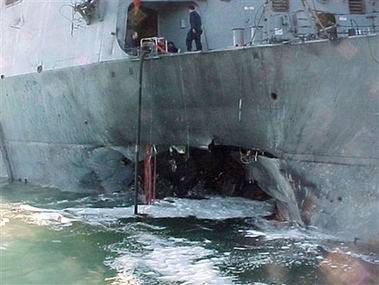Mastermind of USS Cole attack confesses
(AP)Updated: 2007-03-20 08:49
WASHINGTON - A Yemeni portrayed as an al-Qaida operative and a member of a terrorist family confessed to plotting the bombings of the USS Cole and two US embassies in Africa, killing hundreds, according to a Pentagon transcript of a Guantanamo Bay hearing.
Last week, Waleed bin Attash said he helped plan the 1998 embassy bombings in Kenya and Tanzania that killed more than 200, according to the transcript. He also said he helped organize the 2000 attack on the USS Cole in which suicide bombers steered an explosives-laden boat into the guided-missile destroyer, killing 17 sailors.
"I participated in the buying or purchasing of the explosives," bin Attash said when asked what his role was in the attacks. "I put together the plan for the operation a year and a half prior to the operation, buying the boat and recruiting the members that did the operation."
Also alleged to have been Osama bin Laden's bodyguard at one time, bin Attash is in his late 20s and is a Yemeni who was born and raised in Saudi Arabia, authorities have said. Said to be an al-Qaida operational chief, bin Attash is known as Tawfiq bin Attash or Tawfiq Attash Khallada or simply Khallad. He was captured in 2003.
US intelligence documents allege that bin Attash is a "scion of a prominent terrorist family" that includes his father, Mohammed, who was close to bin Laden, and younger brother Hassan, who has been held at Guantanamo since 2004, arriving at the age of 17.
Several brothers attended al-Qaida training camps in Afghanistan in the 1990s and two have been killed, one in a 2001 US airstrike in Afghanistan, the US says.
Bin Attash told a March 12 hearing that he met with the man who did the embassy bombings just a few hours before the operation took place, according to the transcript released by the Defense Department
"I was the link between Osama bin Laden and his deputy Sheikh Abu Hafsd Al Masri," who took over the leadership of al-Qaida in Iraq after its leader, Abu Musab al-Zarqawi, was killed in a US airstrike last June.
Bin Attash also said he was with bin Laden when the Cole was attacked while refueling in Yemen's port of Aden.
Legal experts have criticized the US decision to bar independent observers from the hearings, called combatant status review tribunals. Carl Tobias, a University of Richmond law professor, said "legitimate criticisms can be raised" about the confessions coming out of the hearings.
"Of course, no one's there to know, other than what we see from the transcripts and what the hearing officers hear," Tobias said.
"The claim has been that some of the confessions were extracted by torture or other activities that are inappropriate, and (there are) doubts about whether the detainees are telling the truth," he said.
Many have questioned the confession of Khalid Sheikh Mohammed, also known as KSM, who claimed responsibility or partial responsibility for nearly three dozen plots including the 9/11 attacks on the US, according to transcripts of his March 10 hearing released last week.
Bruce Hoffman, a terrorism expert at Georgetown University, said he has been surprised by the skepticism over the transcripts released so far.
"It dovetails with what we know," Hoffman said of the reported confessions. "With KSM, this guy was the evil genius he describes. ... In terrorism, it's a matter of keeping lots of irons in the fire and it's whichever ones are coming to fruition that you go with."
The hearings are being held to determine whether the
suspects should be declared "enemy combatants" who can be held indefinitely and
prosecuted by military tribunals. If, as expected, the 14 are declared enemy
combatants, they could then be charged and tried under the military commissions
law signed by President Bush in October.
| 1 | 2 |  |
|
||
|
||
|
|

